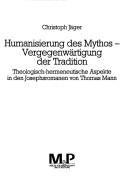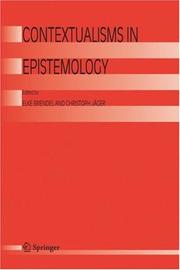| Listing 1 - 10 of 18 | << page >> |
Sort by
|

ISBN: 3476450090 Year: 1992 Publisher: Stuttgart M & P
Abstract | Keywords | Export | Availability | Bookmark
 Loading...
Loading...Choose an application
- Reference Manager
- EndNote
- RefWorks (Direct export to RefWorks)
Book
ISBN: 3825220214 Year: 1998 Publisher: Paderborn Schöningh
Abstract | Keywords | Export | Availability | Bookmark
 Loading...
Loading...Choose an application
- Reference Manager
- EndNote
- RefWorks (Direct export to RefWorks)
Book
ISBN: 1281068004 9786611068004 1402038356 Year: 2005 Publisher: Dordrecht ; Norwell, MA : Springer,
Abstract | Keywords | Export | Availability | Bookmark
 Loading...
Loading...Choose an application
- Reference Manager
- EndNote
- RefWorks (Direct export to RefWorks)
Contextualism has become one of the leading paradigms in contemporary epistemology. According to this view, there is no context-independent standard of knowledge, and as a result, all knowledge ascriptions are context-sensitive. Contextualists contend that their account of this analysis allows us to resolve some major epistemological problems such as skeptical paradoxes and the lottery paradox, and that it helps us explain various other linguistic data about knowledge ascriptions. The apparent ease with which contextualism seems to solve numerous epistemological quandaries has inspired the burgeoning interest in it. This comprehensive anthology collects twenty original essays and critical commentaries on different aspects of contextualism, written by leading philosophers on the topic. The editors’ introduction sketches the historical development of the contextualist movement and provides a survey and analysis of its arguments and major positions. The papers explore, inter alia, the central problems and prospects of semantic (or conversational) contextualism and its main alternative approaches such as inferential (or issue) contextualism, epistemic contextualism, and virtue contextualism. They also investigate the connections between contextualism and epistemic particularism, and between contextualism and stability accounts of knowledge. Elke Brendel is Professor of Philosophy at the Johannes Gutenberg University in Mainz, Germany. She has published numerous articles on logic, epistemology, the philosophy of science, and the philosophy of language. She is the author of Die Wahrheit über den Lügner (The Truth About the Liar, 1992), Grundzüge der Logik II – Klassen, Relationen, Zahlen (Foundations of Logic II – Sets, Relations, Numbers, with Wilhelm K. Essler, 1993), and Wahrheit und Wissen (Truth and Knowledge, 1999). Christoph Jäger is Lecturer in Philosophy at Aberdeen University, United Kingdom, and Privatdozent of Philosophy (honorary office) at the University of Leipzig, Germany. He has published numerous articles on epistemology, the philosophy of mind, and the philosophy of religion. Books: Selbstreferenz und Selbstbewusstsein (Self-reference and Self-knowledge, 1999), Analytische Religionsphilosophie (Analytic Philosophy of Religion, ed., 1998), Kunst und Erkenntnis (Art and Knowledge, ed., with Georg Meggle, 2004), Religion und Rationalität (Religion and Rationality, forthcoming).
Knowledge, Theory of. --- Contextualism (Philosophy) --- Philosophy --- Epistemology --- Theory of knowledge --- Psychology --- Genetic epistemology. --- Epistemology. --- Developmental psychology --- Knowledge, Theory of
Book
ISBN: 9783727215674 3727215674 Year: 2016 Publisher: Bern: Schulthess,
Abstract | Keywords | Export | Availability | Bookmark
 Loading...
Loading...Choose an application
- Reference Manager
- EndNote
- RefWorks (Direct export to RefWorks)
Das Umweltrecht erweist sich, bedingt durch seine Technizität, die Zersplitterung der Rechtsgrundlagen, die föderalen Vollzugsstrukturen und die Schnittstellen zu anderen Rechtsgebieten, als komplexes Gebiet.Die vorliegende Publikation will den Einstieg in das schweizerische Umweltrecht erleichtern. Sie soll einen fundierten Überblick verschaffen über die Rechtsgrundlagen und deren Zusammenhänge, die wichtigsten Begriffe und Instrumente sowie die Kernelemente der einzelnen Regelungsbereiche. Behandelt werden in acht Kapiteln Grundlagen, Immissionsschutz, Abfälle, Altlasten und Bodenschutz, Umgang mit Organismen und umweltgefährdenden Stoffen, Klimaschutz, Gewässerschutz, Natur- und Heimatschutz und Wald.Sie richtet sich vornehmlich an Studierende, welche sich in naturwissenschaftlichen oder rechtswissenschaftlichen Fächern mit dem Umweltrecht befassen. Praktikerinnen und Praktikern aus Behörden, Gerichten, Advokatur oder Unternehmen wird eine zuverlässige Orientierung mit Hinweisen auf Rechtsprechung und Literatur geboten
Book
ISBN: 3110329018 9783110329018 9783868381603 1299722180 311032864X Year: 2012 Volume: n.s., v. 19 Publisher: Frankfurt
Abstract | Keywords | Export | Availability | Bookmark
 Loading...
Loading...Choose an application
- Reference Manager
- EndNote
- RefWorks (Direct export to RefWorks)
This volume collects papers that were presented at the 34th International Ludwig Wittgenstein Symposium 2011 in Kirchberg am Wechsel, Austria. They focus on five key debates in contemporary epistemology: Does the term "to know" vary its meaning according to features of the contexts in which it is uttered? What role may "epistemic virtues" play in our cognitive activities? What is the surplus value of having knowledge instead of mere true belief? What is the structure and significance of testimonial knowledge and belief? And when is disagreement rational, especially if it occurs among "epistemi
Digital
ISBN: 9781402038358 Year: 2005 Publisher: Dordrecht Springer
Abstract | Keywords | Export | Availability | Bookmark
 Loading...
Loading...Choose an application
- Reference Manager
- EndNote
- RefWorks (Direct export to RefWorks)
Book
Abstract | Keywords | Export | Availability | Bookmark
 Loading...
Loading...Choose an application
- Reference Manager
- EndNote
- RefWorks (Direct export to RefWorks)

ISBN: 1402031815 Year: 2005 Publisher: Dordrecht : Springer,
Abstract | Keywords | Export | Availability | Bookmark
 Loading...
Loading...Choose an application
- Reference Manager
- EndNote
- RefWorks (Direct export to RefWorks)
Contextualism (Philosophy) --- Knowledge, Theory of --- Contextualism (Philosophy).
Book
Abstract | Keywords | Export | Availability | Bookmark
 Loading...
Loading...Choose an application
- Reference Manager
- EndNote
- RefWorks (Direct export to RefWorks)
Book
ISBN: 9781402038358 Year: 2005 Publisher: Dordrecht Springer Netherlands
Abstract | Keywords | Export | Availability | Bookmark
 Loading...
Loading...Choose an application
- Reference Manager
- EndNote
- RefWorks (Direct export to RefWorks)
Contextualism has become one of the leading paradigms in contemporary epistemology. According to this view, there is no context-independent standard of knowledge, and as a result, all knowledge ascriptions are context-sensitive. Contextualists contend that their account of this analysis allows us to resolve some major epistemological problems such as skeptical paradoxes and the lottery paradox, and that it helps us explain various other linguistic data about knowledge ascriptions. The apparent ease with which contextualism seems to solve numerous epistemological quandaries has inspired the burgeoning interest in it. This comprehensive anthology collects twenty original essays and critical commentaries on different aspects of contextualism, written by leading philosophers on the topic. The editors' introduction sketches the historical development of the contextualist movement and provides a survey and analysis of its arguments and major positions. The papers explore, inter alia, the central problems and prospects of semantic (or conversational) contextualism and its main alternative approaches such as inferential (or issue) contextualism, epistemic contextualism, and virtue contextualism. They also investigate the connections between contextualism and epistemic particularism, and between contextualism and stability accounts of knowledge. Elke Brendel is Professor of Philosophy at the Johannes Gutenberg University in Mainz, Germany. She has published numerous articles on logic, epistemology, the philosophy of science, and the philosophy of language. She is the author of Die Wahrheit über den Lügner (The Truth About the Liar, 1992), Grundzüge der Logik II - Klassen, Relationen, Zahlen (Foundations of Logic II - Sets, Relations, Numbers, with Wilhelm K. Essler, 1993), and Wahrheit und Wissen (Truth and Knowledge, 1999). Christoph Jäger is Lecturer in Philosophy at Aberdeen University, United Kingdom, and Privatdozent of Philosophy (honorary office) at the University of Leipzig, Germany. He has published numerous articles on epistemology, the philosophy of mind, and the philosophy of religion. Books: Selbstreferenz und Selbstbewusstsein (Self-reference and Self-knowledge, 1999), Analytische Religionsphilosophie (Analytic Philosophy of Religion, ed., 1998), Kunst und Erkenntnis (Art and Knowledge, ed., with Georg Meggle, 2004), Religion und Rationalität (Religion and Rationality, forthcoming).
| Listing 1 - 10 of 18 | << page >> |
Sort by
|

 Search
Search Feedback
Feedback About UniCat
About UniCat  Help
Help News
News